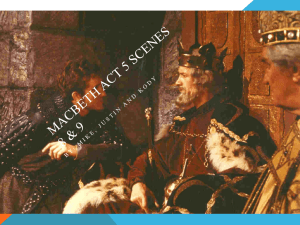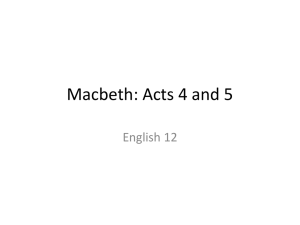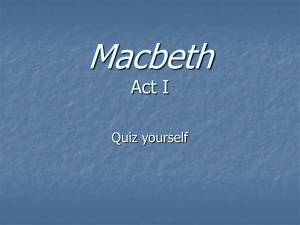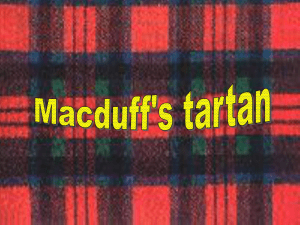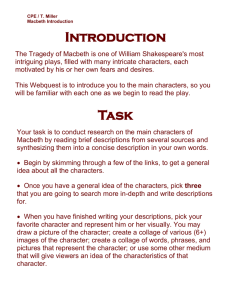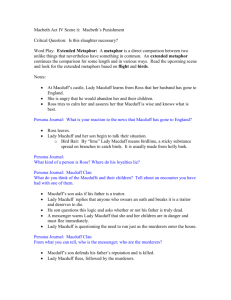Making Meaning Act 4 Answers
advertisement
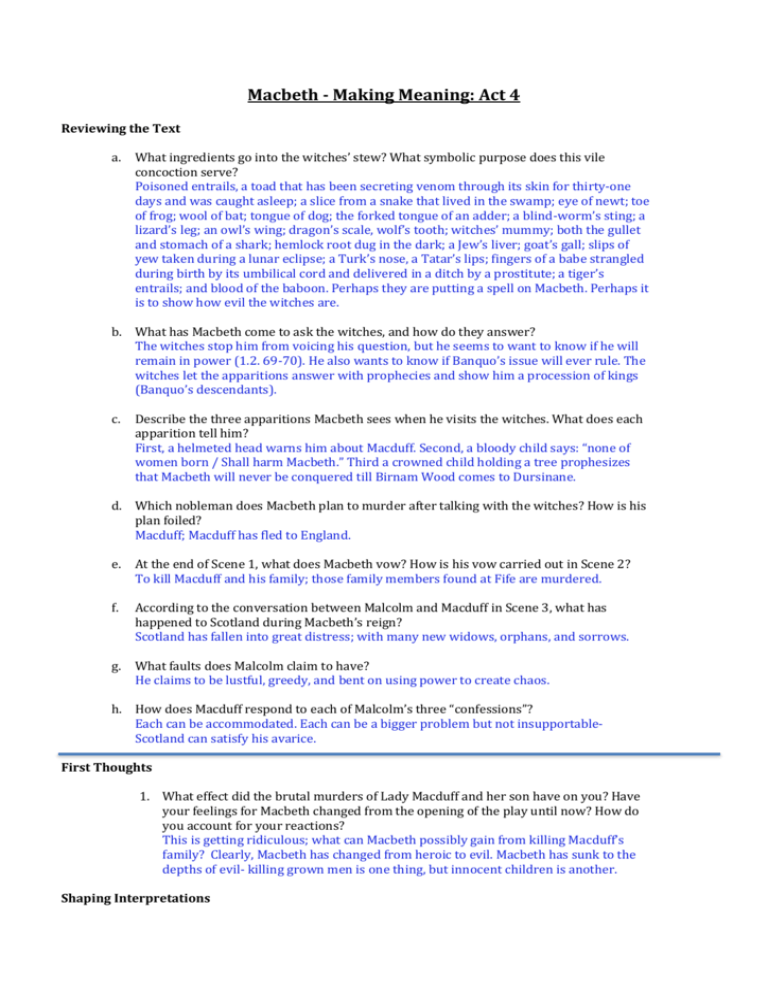
Macbeth - Making Meaning: Act 4 Reviewing the Text a. What ingredients go into the witches’ stew? What symbolic purpose does this vile concoction serve? Poisoned entrails, a toad that has been secreting venom through its skin for thirty-one days and was caught asleep; a slice from a snake that lived in the swamp; eye of newt; toe of frog; wool of bat; tongue of dog; the forked tongue of an adder; a blind-worm’s sting; a lizard’s leg; an owl’s wing; dragon’s scale, wolf’s tooth; witches’ mummy; both the gullet and stomach of a shark; hemlock root dug in the dark; a Jew’s liver; goat’s gall; slips of yew taken during a lunar eclipse; a Turk’s nose, a Tatar’s lips; fingers of a babe strangled during birth by its umbilical cord and delivered in a ditch by a prostitute; a tiger’s entrails; and blood of the baboon. Perhaps they are putting a spell on Macbeth. Perhaps it is to show how evil the witches are. b. What has Macbeth come to ask the witches, and how do they answer? The witches stop him from voicing his question, but he seems to want to know if he will remain in power (1.2. 69-70). He also wants to know if Banquo’s issue will ever rule. The witches let the apparitions answer with prophecies and show him a procession of kings (Banquo’s descendants). c. Describe the three apparitions Macbeth sees when he visits the witches. What does each apparition tell him? First, a helmeted head warns him about Macduff. Second, a bloody child says: “none of women born / Shall harm Macbeth.” Third a crowned child holding a tree prophesizes that Macbeth will never be conquered till Birnam Wood comes to Dursinane. d. Which nobleman does Macbeth plan to murder after talking with the witches? How is his plan foiled? Macduff; Macduff has fled to England. e. At the end of Scene 1, what does Macbeth vow? How is his vow carried out in Scene 2? To kill Macduff and his family; those family members found at Fife are murdered. f. According to the conversation between Malcolm and Macduff in Scene 3, what has happened to Scotland during Macbeth’s reign? Scotland has fallen into great distress; with many new widows, orphans, and sorrows. g. What faults does Malcolm claim to have? He claims to be lustful, greedy, and bent on using power to create chaos. h. How does Macduff respond to each of Malcolm’s three “confessions”? Each can be accommodated. Each can be a bigger problem but not insupportableScotland can satisfy his avarice. First Thoughts 1. What effect did the brutal murders of Lady Macduff and her son have on you? Have your feelings for Macbeth changed from the opening of the play until now? How do you account for your reactions? This is getting ridiculous; what can Macbeth possibly gain from killing Macduff’s family? Clearly, Macbeth has changed from heroic to evil. Macbeth has sunk to the depths of evil- killing grown men is one thing, but innocent children is another. Shaping Interpretations 2. In this act, Macbeth seeks out the witches, whereas they initiated the encounter in Act I. How has his situation changed since he last talked with them? How has his moral character deteriorated? The prophecy has been fulfilled by Macbeth. When they first see him, he is a hero returning from battle, having saved his nation from a traitor. Now he is a murderer and a traitor himself- he has betrayed his country and his honor. 3. Do you think the witches have caused any of these changes, directly or indirectly? Explain your reasons for thinking as you do. Possible responses: Yes, I think they are responsible for setting the train in motion of evil. Macbeth resists as best as he can, but fate (or the spell of the witches) overcomes him; or no, I think Macbeth chooses to act on his own free will. There is no evidence in the play that he has been forced, and I think that he has actually been planning to murder Duncan before ever seeing the witches. 4. In Scene 1, the eight kings appear in what was called in Shakespeare’s day a dumb show- an interpolated brief scene in which nothing is said. What is the point of this particular dumb show? It shows Macbeth that not only will Banquo’s issue rule, but Banquo’s descendants will also provide the country with a succession of kings. 5. In Scene 2, the lines spoken by Macduff’s wife and son illustrate Shakespeare’s great skill at characterization. Using only a few words, he brings the woman and the child to life. How would you describe Lady Macduff? How would you describe the boy? Possible answers: Lady Macduff- loyal, good, protective, worried, loving. Boy- clever, knows the bible well, loyal, brave. 6. Both the murderer and Lady Macduff herself called Macduff a traitor. In what sense does each mean? Do you think Macduff is a traitor in either sense? Lady Macduff calls him a traitor for abandoning his family. The murderers mean that he is a traitor to the king (Macbeth). Most will probably agree that Macduff is not a traitor in any such. 7. In Scene 3, Malcolm deliberately lies to Macduff. What does this behavior, and the reason for it, reveal about Malcolm? He tests Macduff’s loyalty- this shows that he is more savvy than his too-trusting father. Extending the Text 8. In Scene 3, Malcolm and Macduff decry the chaos that Macbeth’s rule has brought to Scotland, as if Macbeth’s disorder had become Scotland’s. Does that happen todaydoes the weakness or the evil of a nation’s leader become that of a nation itself? Explain your response. Some will feel that a leader represents a nation’s status and collective well-being; others will say one person cannot represent so many individuals. Challenging the Text 9. The murder of Macduff’s small son is one of the most pitiful and shocking scenes in Shakespeare. Do you think it might have been better to have it reported after the fact rather than to have shown the carnage onstage? What would be lost and what would be gained by this change? Possible answers: No, it is the step that takes Macbeth beyond the pale; it should be seen and acknowledged. Or yes, it should be left to the audience’s imagination. Without it, the play might lose its immediacy and audience involvement in wanting Macbeth destroyed. The gain would be that the audience would not feel so distraught.




